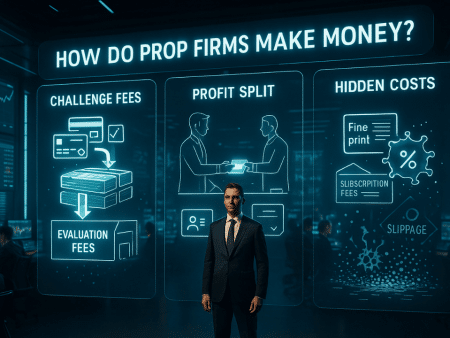Table of Contents
ToggleWhat Are Expert Advisors (EAs) in Trading?
How EAs Work in Forex and CFD Markets
Automated trading systems, known as Expert Advisors, do trades for traders as instructed. In Forex and CFD markets, they see a lot of use. They function inside trading platforms, MetaTrader 4 and MetaTrader 5 being examples. Through examination of market conditions, they develop trading signals. They execute orders. No human does any intervention.
Common Use Cases for EAs
- Expert advisors trade based on trend following. They find price direction and make trades in line with those directions, using momentum indicators to decide when to open or close positions.
- For scalping some expert advisors follow a high-frequency strategy. They make many small trades and try to profit from small price changes.
- Expert advisors do arbitrage. They look for price differences between different markets or brokers. Then they trade to gain profits from those differences.
- At times expert advisors respond to economic news. These automated systems begin trades when news is released, betting on expected price swings.
Are EAs Legal and Safe to Use?
Yes, EAs are legal tools in trading. However, their safety and effectiveness depend on proper programming, backtesting, and risk management. Traders should ensure their EAs comply with the rules of their chosen prop firms and avoid over-optimization, which can lead to poor performance in live markets.
Why Do Some Prop Firms Ban EAs, Bots, and Algos?
Risks and Challenges with EA Usage
Prop firms may restrict or ban EAs due to concerns about:
- Overleveraging: EAs can execute trades rapidly, potentially exceeding risk limits.
- Market Manipulation: Some EAs may engage in practices that distort market prices.
- Server Overload: High-frequency EAs can strain trading servers, affecting overall performance.
Detection of “Toxic Flow” and Arbitrage Bots
“Toxic flow” refers to trading patterns that can harm liquidity providers, such as latency arbitrage. Prop firms monitor for such activities and may ban EAs that exhibit these behaviors to protect their relationships with brokers and maintain fair trading environments.
Common Reasons Firms Disallow Automation
- Uniform Strategies: Multiple traders using the same EA can lead to correlated trading, increasing risk for the firm.
- Lack of Transparency: Some EAs operate as “black boxes,” making it difficult for firms to assess risk.
- Regulatory Compliance: Firms must ensure that automated strategies comply with financial regulations, which can be challenging with EAs.
Benefits & Risks of Using EAs with Prop Firms
Advantages of EA-Compatible Prop Firms
- Efficiency: EAs can execute trades faster than humans, capturing opportunities in volatile markets.
- Consistency: Automated strategies remove emotional biases, leading to more disciplined trading.
- Scalability: EAs can manage multiple accounts or strategies simultaneously.
Disadvantages and Limitations to Know
- Technical Failures: EAs rely on stable internet connections and functioning platforms; disruptions can lead to losses.
- Over-Optimization: EAs tailored too closely to historical data may perform poorly in live markets.
- Lack of Adaptability: EAs may not respond well to unexpected market events or structural changes.
Should You Use an EA or Manual Strategy?
The choice between EAs and manual trading depends on individual preferences, trading goals, and risk tolerance. EAs offer automation and efficiency, while manual trading allows for discretion and adaptability. Some traders opt for a hybrid approach, using EAs for certain strategies and manual trading for others.
Best Prop Firms That Allow EAs in 2025 [Compared]
FTMO
EA Policies
FTMO allows the use of EAs, provided they comply with their trading objectives and rules. Traders must ensure that their EAs do not exceed the maximum capital allocation rule and that they maintain unique strategies to avoid conflicts with other traders using similar EAs.
Pros & Cons
- Pros:
- Access to a wide range of trading instruments.
- Support for MetaTrader platforms.
- Structured evaluation process.
- Cons:
- Strict adherence to trading rules required.
- Potential limitations on third-party EAs.
FundedNext
EA Policies
FundedNext permits the use of third-party EAs and trading bots on MetaTrader 4 and MetaTrader 5 platforms. Traders are responsible for ensuring that their automated strategies comply with the firm’s rules and do not replicate identical trades from other users.
Pros & Cons
- Pros:
- High profit splits up to 95%.
- No time limit in the challenge phase.
- Support for various trading styles.
- Cons:
- Specific rules
- EAs are customized to their style.
Funded Trading Plus
EA Policies
Funded Trading Plus accepts EAs and algorithms across all its trading accounts during the evaluation process, including one-phase and two-phase programs.
Pros & Cons
- Pros:
- Flexible account options, including instant funding.
- Profit splits up to 100%.
- Supportive community and customer service.
- Cons:
- Specific profit targets and drawdown limits apply.
- Traders must adhere to program-specific rules.
Other EA-Friendly Prop Firms
Features & Drawbacks
- Apex Trading Fund:
- Features: Allows EAs without restrictions, instant funding options, high profit splits, supports Forex, crypto, and indices.
- Drawbacks: Traders should review specific program rules for compliance.
- FXIFY:
- Features: Supports EA usage, offers various account types, and competitive profit splits.
- Drawbacks: Specific terms and conditions apply; traders should ensure EAs align with firm policies.
How to Choose the Right Prop Firm for EA Trading
Trading Rules and EA Flexibility
Evaluate whether the prop firm allows the use of EAs and under what conditions. Some firms may require EAs to be unique or prohibit certain strategies.
Minimum Trading Days & Drawdown Limits
Consider the firm’s requirements for minimum trading days and acceptable drawdown limits. These factors can impact the feasibility of using EAs, especially those with high-frequency strategies.
Profit Sharing, Payout Frequency, and Scaling
Assess the firm’s profit-sharing model, payout schedules, and opportunities for account scaling. Firms offering higher profit splits and frequent payouts may be more attractive to EA traders.
Platforms (MetaTrader 4/5, cTrader, etc.)
Ensure the firm supports the trading platform compatible with your EA. MetaTrader 4 and 5 are commonly supported, but it’s essential to verify platform availability.
Customer Support and Community Access
Strong customer support and active trading communities can provide valuable assistance, especially when troubleshooting EA-related issues.
EA Strategy Compatibility: Grid, Martingale, etc.
Confirm that the firm’s rules permit the specific strategies employed by your EA, such as grid or Martingale systems. Some firms may restrict or prohibit certain high-risk strategies.
How We Rated These EA-Compatible Prop Firms
Methodology Overview
Our evaluation considered factors such as EA policies, trading conditions, platform support, customer service, and community feedback.
Key Evaluation Criteria
EA Policy Clarity
We assessed how explicitly each prop firm communicates its EA-related rules and expectations. Transparency is vital, especially when dealing with complex automation strategies.
Trading Conditions
Favorable spreads, low commissions, and fast execution are essential for EA performance. Firms with superior infrastructure scored higher.
Track Record and Payout History
We analyzed user reviews and third-party audits to verify the reliability of payouts, especially for traders using EAs.
Community Sentiment
Forums, Reddit threads, and Trustpilot reviews revealed how real traders perceive each firm’s stance on EA usage. A firm with high approval and responsive support ranked better.
Final Thoughts: Are Prop Firms with EAs Worth It?
When It Makes Sense to Use EAs
If you’re a trader who thrives on logic, discipline, and data-driven strategies, EA-compatible prop firms offer a unique opportunity. They let your bots do the heavy lifting while you focus on refining strategies and optimizing risk.
EAs shine in:
- Volatile markets with short-term trading windows.
- Repetitive trading setups that benefit from automation.
- Strategies that require high execution speed.
However, they’re not a “set and forget” solution. Regular oversight, testing, and adaptation are key to staying funded and scaling up.
Manual vs Automated – What’s Best for You?
Manual trading still appeals to those who love reading charts, reacting to news in real time, and applying discretion. But if you’re the “build it once, let it work 24/5” kind of trader, EAs might be your ticket to trading success—especially with the right prop firm behind you.
FAQ
No. Many prop firms restrict or ban EAs to protect trading infrastructure and avoid risk from strategies like latency arbitrage.
Yes, but only if the firm allows it and your EA complies with their rules. Some firms require custom-coded or non-duplicated bots.
MetaTrader 4 and MetaTrader 5 are the most common. Some firms also support cTrader or NinjaTrader for algorithmic strategies.
Firms use risk monitoring tools to detect suspicious behavior like toxic flow, latency arbitrage, or over-leveraged positions.
About the Author

Andrew Edwards is the co-founder of SecretsToTrading101 and has years of practical experience in online trading, prop firm evaluations and financial content review. He specialises in helping traders understand trading rules, challenge requirements and platform conditions so they can make informed decisions. Andrew oversees the accuracy of our prop firm guides and ensures all information is reviewed against current programme terms and risk standards.


















